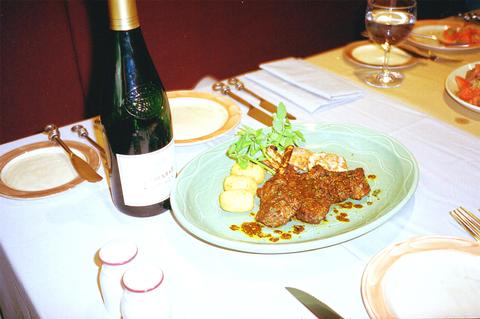The Latin ambiance is pretty popular these days, especially in music, but in cuisine, the food of South America is not well represented in Taipei. Salsa Bistro, tucked away in a lane off fashionable Anho Road, might be leading a new dining sensation with its small but unusual menu and probably the best selection of Chilean wines you are likely to find in this city.
Salsa Bistro's managing director and executive chef Ali Lai (賴奕岭) has created a menu that is representative of much South American cuisine with the exception of Brazil, which has its own separate culinary traditions. The food is served very stylishly, and is prepared and presented in a manner "a little more sophisticated than what is usual in South America." The careful control of cooking time to make sure that lamb chops are nice and tender is an example of this management, but overall, Lai says that the dishes are true to the originals.

PHOTO: IAN BARTHOLOMEW, TAIPEI TIMES
Although small, Salsa Bistro produces everything on the premises, and even the simplest dishes such as the sopaipilla (pumpkin bread with a cilantro and chili sauce) are outstanding in flavor and visual appeal. Other dishes such as the seviche (sword fish marinated in lemon juice) and the empanaditas make great entrees and also a great accompaniment to the extensive wine list. A light refreshing Tarapaca sauvignon blanc is a great way to get the meal going, and for the main meal, moving on the Tarapaca Maipo Valley gran reserva is a recipe for bliss.
Lai, a Chinese born in Chili, came back to Taipei to start an import business for Chilean wine, which explains the extensive wine list (only Chilean wines), which are very well priced and represents a wide range of what Chilean vineyards are now capable of. Most wines are between NT$1,000 to NT$1,500, and dollar for dollar, you are doing much better than with most French wines. Main courses are attractively laid out, but servings are substantial and you won't be walking away hungry.
One of the house specialties is the baked corn and meat pastry (NT$300), which you are unlikely to find anywhere else, but even seemingly common dishes such as roast chicken (NT$500) and grilled lamb chops (NT$580) have a unique twist to them, full of the flavor of unexpected spices.
Salsa's decor does not seek to overplay the Latin theme, with pleasant music of the Buena Vista Social Club variety and traditional pottery, but otherwise aims at modern elegance. Service is knowledgeable, friendly and efficient, and Lai or her staff are on hand to provide explanations as to the various dishes and wines. To finish off the meal, Salsa also has excellent coffee.
Address: 9, Lane 141, Anho Road, Sec. 1, Taipei (台北市安和路一段141巷9號)
Telephone: 02-27003060
Open: Noon to 2:30pm (lunch); 6pm to 11pm (dinner)
Average meal: NT$500
Details: English menu available. Credit cards accepted

Taiwan has next to no political engagement in Myanmar, either with the ruling military junta nor the dozens of armed groups who’ve in the last five years taken over around two-thirds of the nation’s territory in a sprawling, patchwork civil war. But early last month, the leader of one relatively minor Burmese revolutionary faction, General Nerdah Bomya, who is also an alleged war criminal, made a low key visit to Taipei, where he met with a member of President William Lai’s (賴清德) staff, a retired Taiwanese military official and several academics. “I feel like Taiwan is a good example of

March 2 to March 8 Gunfire rang out along the shore of the frontline island of Lieyu (烈嶼) on a foggy afternoon on March 7, 1987. By the time it was over, about 20 unarmed Vietnamese refugees — men, women, elderly and children — were dead. They were hastily buried, followed by decades of silence. Months later, opposition politicians and journalists tried to uncover what had happened, but conflicting accounts only deepened the confusion. One version suggested that government troops had mistakenly killed their own operatives attempting to return home from Vietnam. The military maintained that the

Before the last section of the round-the-island railway was electrified, one old blue train still chugged back and forth between Pingtung County’s Fangliao (枋寮) and Taitung (台東) stations once a day. It was so slow, was so hot (it had no air conditioning) and covered such a short distance, that the low fare still failed to attract many riders. This relic of the past was finally retired when the South Link Line was fully electrified on Dec. 23, 2020. A wave of nostalgia surrounded the termination of the Ordinary Train service, as these train carriages had been in use for decades

Lori Sepich smoked for years and sometimes skipped taking her blood pressure medicine. But she never thought she’d have a heart attack. The possibility “just wasn’t registering with me,” said the 64-year-old from Memphis, Tennessee, who suffered two of them 13 years apart. She’s far from alone. More than 60 million women in the US live with cardiovascular disease, which includes heart disease as well as stroke, heart failure and atrial fibrillation. And despite the myth that heart attacks mostly strike men, women are vulnerable too. Overall in the US, 1 in 5 women dies of cardiovascular disease each year, 37,000 of them